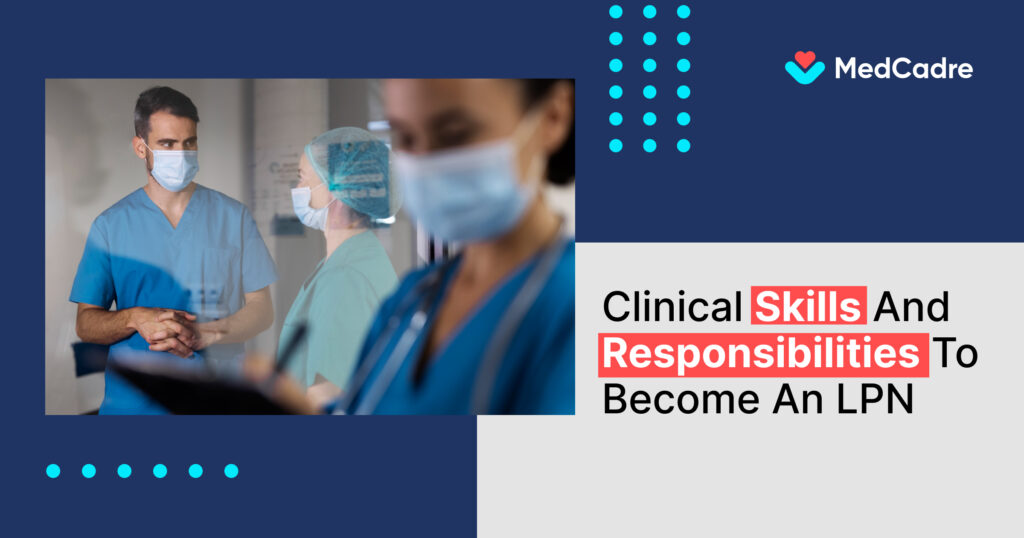If you’re considering your career in the nursing field, becoming a licensed practical nurse (LPN) could be the right choice for you. LPNs are crucial in the healthcare sector, requiring a combination of practical and theoretical knowledge, hands-on clinical skills, and a deep sense of responsibility to provide optimal patient care in hospitals and clinics.
LPNs directly administer essential care to patients, ensuring their comfort. In this article, we’ll delve into the duties and responsibilities of LPNs necessary to pursue this career in the USA and the major steps you need to follow. Let’s dive in!
LPN duties and responsibilities in the healthcare industry
Educational requirement
The first step towards becoming an LPN involves education, where individuals acquire both theoretical knowledge and practical skills. LPN education typically takes less time compared to that of registered nurses (RNs), making it an appealing option for many aspiring nurses. Here’s a breakdown of the key steps to becoming an LPN:
- High school diploma or GED: This serves as the foundational requirement to embark on your LPN career.
- Accredited LPN program: Enroll in a state-approved LPN program offered at vocational schools, community colleges, or hospitals. These programs typically last one year and involve a combination of classroom instruction and clinical rotations in healthcare settings.
- Pass the NCLEX-PN exam: Upon completion of your LPN program, you must pass the National Council Licensure Examination for Practical Nurses (NCLEX-PN). This national exam evaluates your competency in delivering safe and effective nursing care.
Clinical skills training
LPN clinical skills training is an important aspect to address before discussing LPN duties and responsibilities. This training is crucial in developing the practical skills and competencies necessary to provide excellent patient care. During their educational phase, LPN students participate in supervised clinical skills rotations, which allow them to observe and learn in real healthcare environments. This hands-on experience helps students to effectively apply their theoretical knowledge.
Clinical skills encompass a wide range of areas, including:
Patient assessment
LPNs play a vital role in adapting care based on patient assessments. These assessments involve gathering information about a patient’s medical history, current symptoms, vital signs, and any existing or potential diseases. Their ability to conduct comprehensive assessments lays the groundwork for accurate diagnoses and effective treatment plans.
Medication administration
LPNs play a vital role in ensuring patients receive medications safely and effectively. This task requires careful attention to detail and a thorough understanding of both the patient and the medication. LPNs typically undergo specific medication administration training to equip them with the knowledge and skills to:
- Review patient information: This includes allergies, current medications, and any medical conditions that could affect how the medication works.
- Identify the correct medication: Double-checking the medication name, dosage, and form is crucial.
- Administer medication accurately: This may involve giving pills orally, administering injections, or using other routes of administration.
- Monitor for side effects: LPNs report any adverse reactions to the doctor or registered nurse.
Wound care
Proficiency in basic wound care is essential for LPNs. This includes tasks like assessing and dressing wounds, following physician orders for wound medications, and monitoring for signs of infection. LPNs also educate patients about the healing process and help them understand how to care for their wounds. They play a crucial role in recognizing potential complications and reporting them to a registered nurse or doctor for further intervention.
Intravenous (IV) therapy
LPNs can be trained to administer intravenous medications and fluids but under the supervision of a registered nurse (RN). This involves knowing how to properly monitor and maintain existing IV lines, watch for problems associated with them, and assist with understanding the principles of keeping fluids balanced.
Patient education
LPNs play a crucial role in communicating effectively with patients and their families. This includes providing clear instructions on medications, treatment plans, and self-care practices in simple language with short, to-the-point sentences. Avoid technical terms and legal jargon. Opt for active voice to ensure instructions are clear and easy to follow. Remember, patient education is a vital part of your job, and it’s up to you to provide information that is easily understood by all.
Responsibilities of an LPN
LPN duties and responsibilities play a crucial role in the overall patient care team. Their responsibilities extend beyond clinical skills to encompass a range of duties aimed at ensuring the well-being of patients. Some key responsibilities include:
Collaboration with the healthcare team
- LPNs work closely with registered nurses, physicians, and other healthcare professionals. Effective collaboration is essential for providing comprehensive and coordinated care to patients.
Monitoring patient progress
- The duties and responsibilities of a Licensed Practical Nurse (LPN) include regularly monitoring and documenting the progress of patients.This involves tracking vital signs, observing symptom changes, and communicating findings to the healthcare team.
Assisting with activities of daily living (ADLs)
- LPNs assist patients with various activities of daily living, such as bathing, dressing, and feeding. This aspect of care requires empathy, patience, and a commitment to maintaining the dignity of each patient.
Advocating for patients
- LPNs serve as advocates for their patients, ensuring that their needs and concerns are communicated to the healthcare team. This advocacy role is crucial in promoting patient-centered care and addressing individual preferences.
Also read: Licensed Practical Nurse Salary Guide 2024: How Much Do LPNs Make?
Ethical considerations and professionalism for LPN duties and responsibilities
LPNs must adhere to a strict code of ethics and maintain a high level of professionalism. This includes respecting patient confidentiality, demonstrating cultural competence, and upholding the principles of beneficence and non-maleficence. Ethical considerations and professionalism are integral aspects of providing compassionate and patient-centered care.
How to apply for an LPN job after training and certification?
Once you’ve completed your education, training, certification, and licensing, the next step is applying for a job. Many people wonder how to find the perfect position after fulfilling the basic requirements. The answer is simple: MedCadre.
MedCadre offers a vast selection of nursing jobs, with over 3,000 listings to explore. Here’s how to get started with your job search:
-
- Visit the MedCadre website.
- Explore the career page and find jobs that match your qualifications and interests.
- Apply for the positions that match your requirements.
- Soon, you will receive a call from our executive.
Conclusion
Becoming a Licensed Practical Nurse (LPN) is a challenging yet rewarding journey that requires a strong foundation in education, hands-on LPN duties and responsibilities, and a commitment to ethical and professional standards. It offers individuals an opportunity to make a meaningful impact on the lives of patients. Aspiring LPNs can embark on a fulfilling healthcare career path by honing their LPN clinical skills and embracing their responsibilities with dedication.


